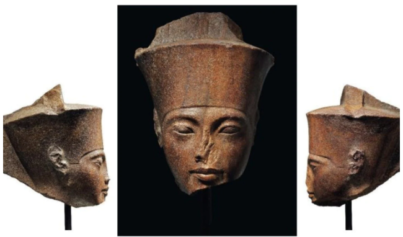Ptahhotep was an ancient Egyptian official during the late 25th century BC and early 24th century BC. He was the city administrator and vizier (Prime Minister) during the reign of Djedkare Isesi in the 5th Dynasty. He is credited with authoring The Instruction of Ptahhotep, an early piece of Egyptian “wisdom literature” meant to instruct young men in appropriate behavior.
The following are excerpts from The Instruction of Ptahhotep
Here begin the proverbs of fair speech, spoken by the Hereditary Chief, the Holy Father, Beloved of the God, the Eldest Son of the King, of his body, the Governor of his City, the Vezier, Ptah-hotep, when instructing the ignorant in the knowledge of exactness in fair-speaking; the glory of him that obeyeth, the shame of him that transgresseth them.
He said unto his son:
1. Be not proud because thou art learned; but discourse with the ignorant man, as with the sage. For no limit can be set to skill, neither is there any craftsman that possesseth full advantages. Fair speech is more rare than the emerald that is found by slave-maidens on the pebbles.
2. If thou find an arguer talking, one that is well disposed and wiser than thou, let thine arms fall, bend thy back, be not angry with him if he agree (?) not with thee. Refrain from speaking evilly; oppose him not at any time when he speaketh. If he address thee as one ignorant of the matter, thine humbleness shall bear away his contentions.
3. If thou find an arguer talking, thy fellow, one that is within thy reach, keep not silence when he saith aught that is evil; so shalt thou be wiser than he. Great will be the applause on the part of the listeners, and thy name shall be good in the knowledge of princes.
4. If thou find an arguer talking, a poor man, that is to say not thine equal, be not scornful toward him because he is lowly. Let him alone; then shall he confound himself. Question him not to please thine heart, neither pour out thy wrath upon him that is before thee; it is shameful to confuse a mean mind. If thou be about to do that which is in thine heart, overcome it as a thing rejected of princes.
5. If thou be a leader, as one directing the conduct of the multitude, endeavour always to be gracious, that thine own conduct be without defect. Great is Truth, appointing a straight path; never hath it been overthrown since the reign of Osiris. One that oversteppeth the laws shall be punished. Overstepping is by the covetous man; but degradations (?) bear off his riches, for the season of his evil-doing ceaseth not. For he saith, ‘I will obtain by myself for myself,’ and saith not, ‘I will obtain because I am allowed.’ But the limits of justice are steadfast; it is that which a man repeateth from his father.
6. Cause not fear among men; for [this] the God punisheth likewise. For there is a man that saith, ‘Therein is life’; and he is bereft of the bread of his mouth. There is a man that saith, ‘Power [is therein]’; and he saith, ‘I seize for myself that which I perceive.’ Thus a man speaketh, and he is smitten down. It is another that attaineth by giving unto him that hath not; not he that causeth men dread. For it happeneth that what the God hath commanded, even that thing cometh to pass. Live, therefore, in the house of kindliness, and men shall come and give gifts of themselves.
7. If thou be among the guests of a man that is greater than thou, accept that which he giveth thee, putting it to thy lips. If thou look at him that is before thee (thine host), pierce him not with many glances. It is abhorred of the soul[5] to stare at him. Speak not till he address thee; one knoweth not what may be evil in his opinion. Speak when he questioneth thee; so shall thy speech be good in his opinion. The noble who sitteth before food divideth it as his soul moveth him; he giveth unto him that he would favour—it is the custom of the evening meal. It is his soul that guideth his hand. It is the noble that bestoweth, not the underling that attaineth. Thus the eating of bread is under the providence of the God; he is an ignorant man that disputeth it.
8. If thou be an emissary sent from one noble to another, be exact after the manner of him that sent thee, give his message even as he hath said it. Beware of making enmity by thy words, setting one noble against the other by perverting truth. Overstep it not, neither repeat that which any man, be he prince or peasant, saith in opening the heart; it is abhorrent to the soul.
9. If thou have ploughed, gather thine harvest in the field, and the God shall make it great under thine hand. Fill not thy mouth at thy neighbours’ table…. If a crafty man be the possessor of wealth, he stealeth like a crocodile from the priests.
Let not a man be envious that hath no children; let him be neither downcast nor quarrelsome on account of it. For a father, though great, may be grieved; as to the mother of children, she hath less peace than another. Verily, each man is created [to his destiny] by the God, Who is the chief of a tribe, trustful in following him.
10. If thou be lowly, serve a wise man, that all thine actions may be good before the God. If thou have known a man of none account that hath been advanced in rank, be not haughty toward him on account of that which thou knowest concerning him; but honour him that hath been advanced, according to that which he hath become.
Behold, riches come not of themselves; it is their rule for him that desireth them. If he bestir him and collect them himself, the God shall make him prosperous; but He shall punish him, if he be slothful.
11. Follow thine heart during thy lifetime; do not more than is commanded thee. Diminish not the time of following the heart; it is abhorred of the soul, that its time [of ease] be taken away. Shorten not the daytime more than is needful to maintain thine house. When riches are gained, follow the heart; for riches are of no avail if one be weary.
12. If thou wouldest be a wise man, beget a son for the pleasing of the God. If he make straight his course after thine example, if he arrange thine affairs in due order, do unto him all that is good, for thy son is he, begotten of thine own soul. Sunder not thine heart from him, or thine own begotten shall curse [thee]. If he be heedless and trespass thy rules of conduct, and is violent; if every speech that cometh from his mouth be a vile word; then beat thou him, that his talk may be fitting. Keep him from those that make light of that which is commanded, for it is they that make him rebellious. And they that are guided go not astray, but they that lose their bearings cannot find a straight course.
13. If thou be in the chamber of council, act always according to the steps enjoined on thee at the beginning of the day. Be not absent, or thou shall be expelled; but be ready in entering and making report. Wide is the seat of one that hath made address. The council-chamber acteth by strict rule; and all its plans are in accordance with method. It is the God that advanceth one to a seat therein; the like is not done for elbowers.
14. If thou be among people, make for thyself love, the beginning and end of the heart. One that knoweth not his course shall say in himself (seeing thee), ‘He that ordereth himself duly becometh the owner of wealth; I shall copy his conduct.’ Thy name shall be good, though thou speak not; thy body shall be fed; thy face shall be [seen] among thy neighbours; thou shalt be provided with what thou lackest. As to the man whose heart obeyeth his belly, he causeth disgust in place of love. His heart is wretched (?), his body is gross (?), he is insolent toward those endowed of the God. He that obeyeth his belly hath an enemy.
15. Report thine actions without concealment; discover thy conduct when in council with thine overlord…


